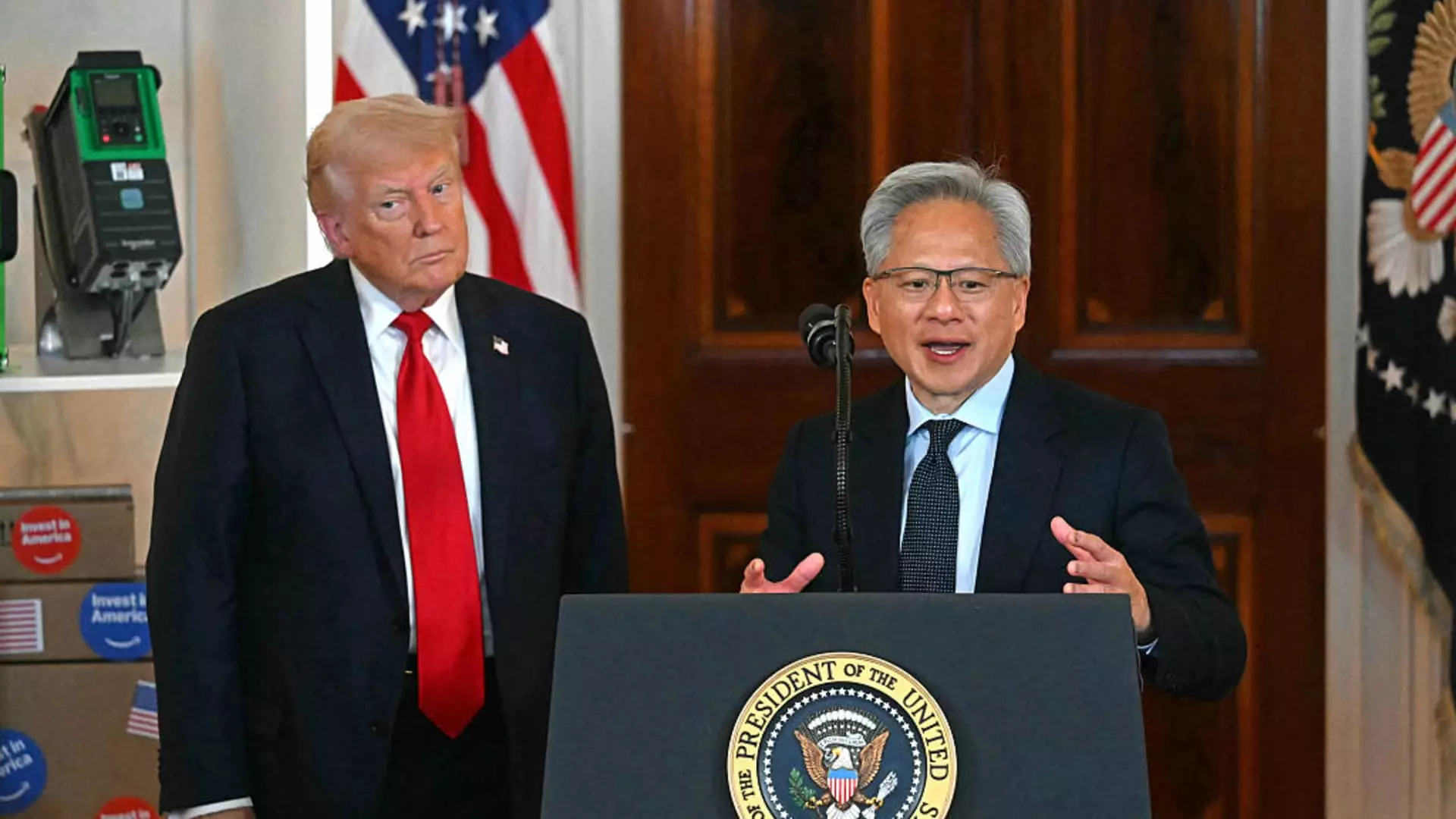In the current debate surrounding U.S. technology exports, there’s a disturbing disconnect between the rhetoric of innovation and the murky realities of geopolitics. The recent move by President Donald Trump to permit American chip giants Nvidia and AMD to sell AI semiconductors to China, with a hefty 15% revenue cut to the U.S. government, exemplifies a perilous capitulation of national interests. While some may argue this is a pragmatic step to foster global commerce and innovation, the underlying implications threaten to erode America’s competitive edge and national security. The narrative of technological supremacy, long the foundation of U.S. influence, now seems vulnerable to transactional compromises that prioritize short-term revenue over strategic security.
The open letter from six Senate Democrats underscores this peril, warning that ceding access to top-tier AI chips could inadvertently bolster China’s military and technological capabilities. This perspective isn’t a mere partisan stance but a reflection of a broader concern: the erosion of critical technological sovereignty. The U.S. has historically used restrictions and export controls as tools to maintain technological superiority — a strategic gamble that has served as a cornerstone of national defense. Allowing the sale of advanced AI components to China, especially with financial considerations for the U.S. government, complicates this legacy, revealing a misguided focus on immediate gains rather than long-term safety.
The High Stakes of AI and Military Empowerment
The assumption that Nvidia’s chips like the H20 and AMD’s MI308 are purely commercial tools is dangerously naive. As Chinese military ambitions grow, so too does the strategic importance of AI-driven technology. While Nvidia staunchly denies that their chips will bolster military capabilities, history warns us against underestimating dual-use technology. Sophisticated AI hardware can, intentionally or not, enhance military systems, surveillance, and autonomous weaponry. Downplaying these risks undermines the complex web of global security and perpetuates a dangerous myth: that market access and technological progress are inherently beneficial without considering potential military misuse.
Furthermore, the idea that restricting access stifles innovation ignores the broader strategic context. The United States’ leadership in AI and chip manufacturing was built on an ecosystem of innovation protected by strategic controls, not merely competitive market forces. Erosion of such controls invites an era where American technological dominance becomes a patchwork of short-term deals, ultimately diminishing America’s leverage and strategic advantage on the global stage.
Profit Over Patriotism: An Ethical Dilemma
The Trump administration’s decision to include a revenue-sharing arrangement — a 15% cut — functions as a symbolic toll, a toll that fundamentally commodifies national security. It demonstrates a troubling prioritization of monetary gain over safeguarding critical technological assets. When elected officials and policymakers prioritize revenue streams over the integrity of national security, they betray the foundational principles of their responsibilities.
This approach is not only shortsighted but perilous. It signals to allies and adversaries alike that American technology can be bought or sold for profit, stripping away the exclusivity and strategic value that have historically underpinned America’s technological leadership. If the very tools that enable the U.S. to outpace rivals are endlessly commodified, the nation’s ability to project strength and innovation becomes fragile. The consequences ripple outward — from emboldened competitors to diminished leverage in diplomatic and military arenas.
The Broader Implication: A Call for Critical Reflection
Allowing AI chips to flow into China unchecked reveals a troubling willingness to gamble with the future. The silence from White House officials and major corporations like AMD only amplifies questions about the true motivations behind these decisions. Is this a genuine attempt at fostering innovation, or is it a capitulation driven by economic convenience?
Regardless of intent, the outcome will likely favor interests that are not aligned with national security. Meanwhile, international observers—especially in China—are readjusting their strategies, urging their industries to avoid imported U.S. chips altogether. This logistical shift signals that the U.S. is losing its grip on control, risking a future where technological leads are no longer guaranteed but are instead up for grabs in high-stakes economic negotiations.
As a centrist liberal, I believe this scenario demands sober introspection. Prioritizing profit and open market access at the expense of securing our technological future is a gamble that few countries can afford to take. In the relentless race for AI dominance, the U.S. must reckon with its own shortsightedness, recognizing that true technological leadership involves safeguarding its assets and not gambling them away for fleeting monetary benefits. America’s long-term security and moral standing depend on it.

